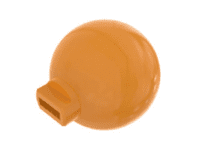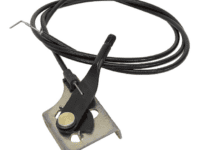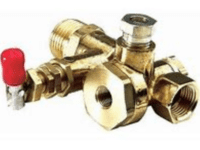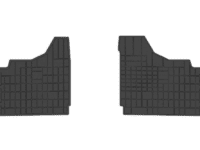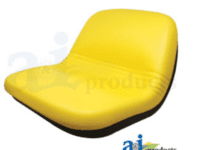Integration advantages of Deere tractor, cart, tool and technology
To win big in small grains, it takes a seeding solution that superseeds your expectations. John Deere delivers with a complete line of everything you need – and the sizes you want – to seed for success. Air-hoe drills. Commodity air carts. No-till air drills. Openers. Fertilizer attachments. Central commodity systems. Box drills. Plus precision ag technology to stretch your productivity to higher levels. But it’s far more than iron and technology. It’s the exceptional agronomic know-how and unsurpassed dealer support in all phases of production to keep you running. With our latest additions to equipment and openers, our seeding solutions deliver the next-generation performance you need to help you reach the full potential of each seed. That’s our commitment to you.
Improved meter access with new frame design
The tank on the N500C has been moved up and back to allow for better access to the meters. The blower fan has been relocated to the front of the tank to allow non-obstructed access to all four meters.
Rear of N500C machine
Relocated blower fan
Easy meter access
The updated tank design is also larger. The 9.15-m (30-ft) to 11-m (36-ft) models offer a 3523.9 -L (100-bu) tank. The 12.2-m (40-ft) and 12.8-m (42-ft) models offer a 4228.7-L (120-bu) tank.
3523.9-L (100-bu) tank
Tank cleanout has also been improved. Producers can place a seed box or conveyer under the tanks to empty out excess seed. The tank has been designed so there is minimal seed left in the tank after it has been emptied.
Cleanout with a seed box
Cleanout with seed tender
Calibrating the meters has also been improved thanks to electric drive metering. The N500C is calibrated stationary similar to larger air carts. Catch bags are placed under each meter, and the meters turn a pre-determined amount of revolutions. Catch bags are weighted and entered into the SeedPlus app or on the Gen 4 display in order to generate a meter displacement value (MDV).
Calibrating the meters
Electric drives enabling SectionCommand™ system
For the first time, meter sections are controlled with electric motors. Each meter section has its own electric drive motor. This eliminates the need for a variable-rate drive hydraulic motor or a ground drive wheel. This also enables the SectionCommand system and variable/prescription seeding.
Electric drive motor on meter
SeedStar run page showing four sections and prescription (Rx) seeding
Perscription/variable-rate seeding allows growers to apply the right amount of seed depending on predetermined management zones. Four-section SectionCommand has shown a potential seed savings of 4 to 6 percent depending on field size and shape.
Power generation
The electric motors are powered by a power take-off (PTO) power generation unit or an onboard hydraulic power generator. Growers can choose either of these options based on their tractor limitations. The on-board system utilizes power beyond, whereas the PTO system frees up hydraulic capacity on the tractor as the PTO powers the generator.
PTO power generation unit
On-board power generation unit
Calibrate from the cab with the John Deere ActiveCal™ system
ActiveCal initiated on C-Series Air Carts
ActiveCal initiated on an N500C
The more frequently you calibrate your seeding equipment, the more accurate it will be. With ActiveCal, available only from John Deere on the N500C and C-Series Air Carts, you can do all the calibration from your cab to minimize variation in product metering. It takes only minutes, so there’s no need for back-and-forth trips to the cart. ActiveCal is designed to recalibrate itself throughout your work day to give you confidence in changing product weight and weather conditions.
A number of variables, including product weight and changing climate conditions throughout the day, will have an effect on any volumetric metering system; with the John Deere ActiveCal system, calibration can be done from the cab of the tractor, while seeding, to minimize the variation in product metering.
The process to calibrate the implement starts with the Gen 4 4600 CommandCenter™ Display in the work setup page, where the operator defines product types, rates and selects meter rollers. Based on information entered into the work setup page, a preconfigured meter displacement value (MDV) will populate per meter. An initial manual calibration will give the most accurate MDV to start with. However, the preconfigured MDV will be a good starting point for growers who do not wish to manually calibrate.
The operator engages ActiveCal while stationary by selecting the button on the screen and then begins seeding. When enough product has been metered out, typically after about 3.2 to 4.9 ha (8 to 12 acres), the Gen 4 CommandCenter will prompt the operator to stop when convenient to do so. At that time, the data points are calculated and a new MDV with percent difference is displayed on screen. The operator can accept or reject the new MDV. If accepted, the system automatically calibrates to the new MDV. If rejected, the system continues at the previously calibrated numbers.
Tank scales provide tank weights to ActiveCal system
SeedPlus™ mobile app
SeedPlus app homescreen
Tank scale weights and meter calibrations can be completed from an Android™ or iOS® mobile device anywhere around the machine.
Calibrating tank scales
Calibration complete
Tank scale weights can be viewed anywhere within 15.2 m (50 ft). The SeedPlus app can also be used to calibrate the tank scales as needed.
Initial meter calibration
Select meters to calibrate
Select the meters that toned to be calibrated. Calibrations are recommended every morning or when crops/seed sizes are changed.
Steps to complete calibration
Follow the on-screen prompts to complete the calibration.
Press meter calibration switch
Once the catch bags are in place, hold down the meter calibration switch until the number of revolutions is complete.
Weights of bag for each meter
Entering the weight of the bags
Enter the weights of the bags into the app.
Save meter displacement values (MDV)
MDV values are updated
The SeedPlus app will calculate MDV based on the number of revolutions and the product weights. Operators can choose to accept the proposed MDV values or not.
Android is a trademark of Google LLC. iOS is a trademark of Cisco Technology, Inc. used under license by Apple Inc.
Confidence in rates from row to row with RelativeFlow™ Blockage sensing
With RelativeFlow Blockage sensing, operators can see the flow of both seed and fertilizer from inside the tractor cab. Sensors on all secondary hoses monitor the relative product flow row to row, giving you a better view of the flow rate of both seed and fertilizer from the cart to the opener from inside your tractor cab. This technology can help you identify any problems before a potential blockage occurs.
RelativeFlow Blockage is available in all run configurations on the following models (all widths):
- H500
- H500F
- P500
- N500
- N500F
- N500C
- 730LL
RelativeFlow Blockage is compatible with hydraulic drive carts: model year 2014 and newer 1910, all 19,381.5-L (550-bu) 1910 Carts, and C650 and C850 Air Carts.
Below are the Gen 4 display screens for the blockage monitoring system. For complete details and information, see the owner’s manual.
Blockage monitoring screen on Gen 4 display
The RelativeFlow Blockage sensing chart shows the amount of flow through each sensor on the selected tower. Sensitivity for the blockage system can be adjusted if desired, as shown below.
Blockage Setup screen on Gen 4 display
Blockage warning sensitivity allows the producer to set and change the sensitivity of the sensors to meet their preferences and varying crop/fertilizer types. Increasing the sensitivity means the system is more likely to show a false blockage, while less sensitivity means the system is more likely to miss a blockage.
Multiple run-page alarm behavior options are available for selection.
Blockage monitoring screen on Gen 4 display
Below are the Gen 4 display screens for the blockage monitoring system on the N500C.
For complete details and information reference, the owner’s manual.
RelativeFlow Blockage configured run page
The SeedStar™ system run page displays the five major run settings. Clicking on any of the tiles will take an operator to that specific page (shown below).
Operators can zoom into flow details by meter section when selecting blockage tiles
Operators can zoom into the row level to access row/sensor information and turn a sensor on/off independently
Blockage sensitivities and alarm delays are all set up on one easy-to-navigate screen
Blockage alarm delays can be set up by clicking on the advanced settings button from the blockage set-up screen.
- A blockage delay is how long a blockage should occur before an alarm is sounded.
- The blockage alarm reminder is how often the alarm should sound when a blockage occurs.
- The meter on delay is the time from when the meter is turned on until the blockage sensor should start monitoring for blockage.
- The meter off delay is the time from when the meter is turned off until the blockage sensor should start monitoring to verify no flow.
For more detailed information, see the owner’s manual.
Air tools with RelativeFlow Blockage are not compatible with 1910 air carts with ground drive.
Improve seed placement accuracy from the cab with TruSet™ downforce control
Downforce control from the Gen 4 display
TruSet downforce allows operators to set downforce pressures from inside the cab. Downforce can easily be changed by the push of a button as soil conditions very. Proper downforce is directly related to a consistent seeding depth, which leads to improved even emergence, plant density, and maturity.
TruSet system quick-reference guide
TruSet downforce settings:
A. Select to manually input a value
B. Select to increase or decrease the target force of the openers
C. Downforce toggle button: select to enable or disable the downforce
D. Indicates that the downforce is enabled
E. Indicates that the downforce is disabled
F. Indicates that the downforce is enabled but not applying
Get into the field sooner and stay longer with high floatation tires
The N500C offers 33×15.5R16.5 tires standard on all machines, resulting in better floatation and less compaction and allowing operators to get into the field sooner and stay in the field longer. The mainframe is also equipped with walking beams to allow for better ground following.
500/40R16.5 tires with walking beam
33×15.5R16.5 tires with walking beam
31×13.5R15 tires on wing frame
| Option code | Width | Mainframe front tire size | Number of tires | Mainframe rear tire size | Number of tires | Wing frame tire size | Number of tires |
| 3610 | All | 33×15.5R16.5 | 4 | 33×15.5R16.5 | 4 | 31×13.5R15 | 4 |
| 3611 | All | 33×15.5R16.5 | 4 | 33×15.5R16.5 | 4 | 31×13.5R15 | 8 |
| 3612 | 9.5/11-m (30/36-ft) |
33×15.5R16.5 | 4 | 500/40R16.5 | 4 | 33×15.5R16.5 | 8 |
| 3613 | 12.2/12.8-m (40/42-ft) |
500/40R16.5 | 4 | 500/40R16.5 | 4 | 33×15.5R16.5 | 8 |
Tire area comparison
Versatile machine configurations
N500C with SeedMetering2
N500C in the field
The N500C is designed for no-till seeding. The N500C with SeedMetering2 offers accurate volumetric metering in a compact tank-mounted-on-frame design, with the convenience of the Central Commodity System (CCS™) bulk-fill capabilities.
The N500C is available in single- or dual-rank designs, with 9.15-m, 11-m, 12.2-m, and 12.8-m (30-ft, 36-ft, 40-ft, and 42-ft) working widths. The single-rank N500C is available in 38.1-cm (15-in.) row spacing, making for a highly productive soybean seeding machine, while the dual-rank models are available in 19-cm or 25.4-cm (7.5-in. or 10-in.) row spacings. The dual-rank models also feature an optional dual row spacing package, which allows them to seed in their standard spacing or lock-up one rank and seed in 38.1-cm or 50.8-cm (15-in. or 20-in.) row spacings.
The productivity of the CCS comes standard with the N500C. The CCS bulk-fill tanks feature 3523.9-L (100-bu) capacity on the 9.15-m (30-ft) to 11-m (36-ft) models. The 12.2-m (40-ft) and 12.8-m (42-ft) models offer 4228.7 L (120 bu) of capacity to allow operators to seed more acres before stopping to refill.
The N500C features the Pro-Series™ No-Till Openers. With well over one million no-till openers in the field today, this proven opener offers accurate seed placement with the exclusive active hydraulic downforce ground-following system while minimizing moisture loss with its low-disturbance opener design.






